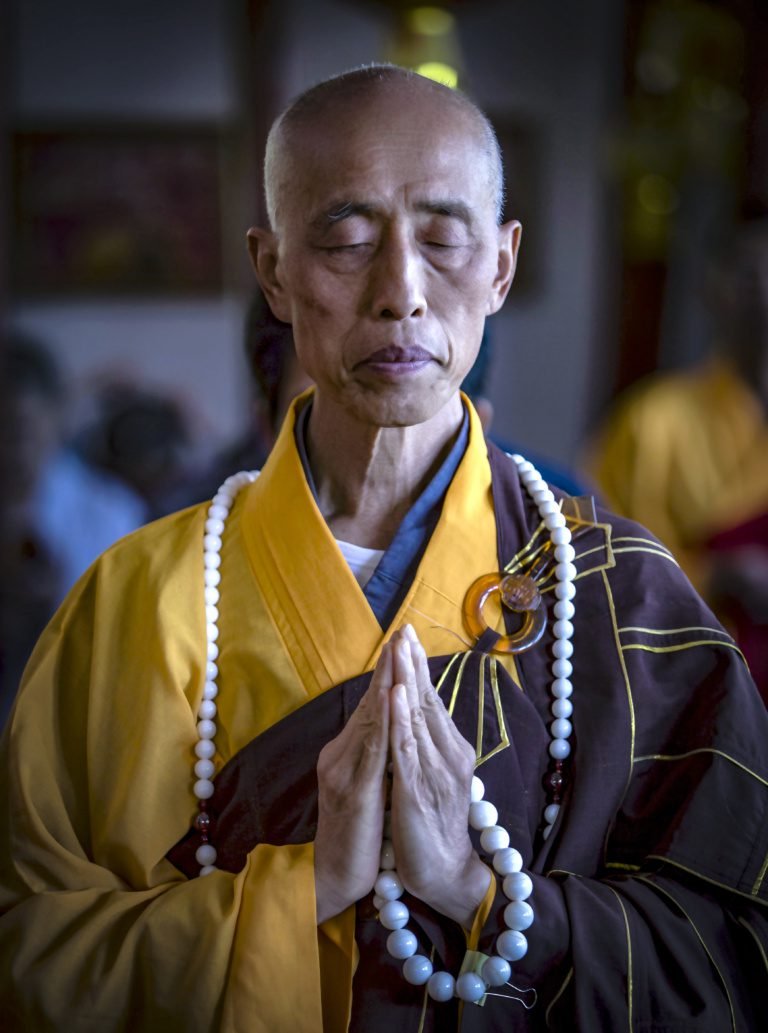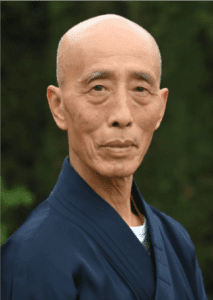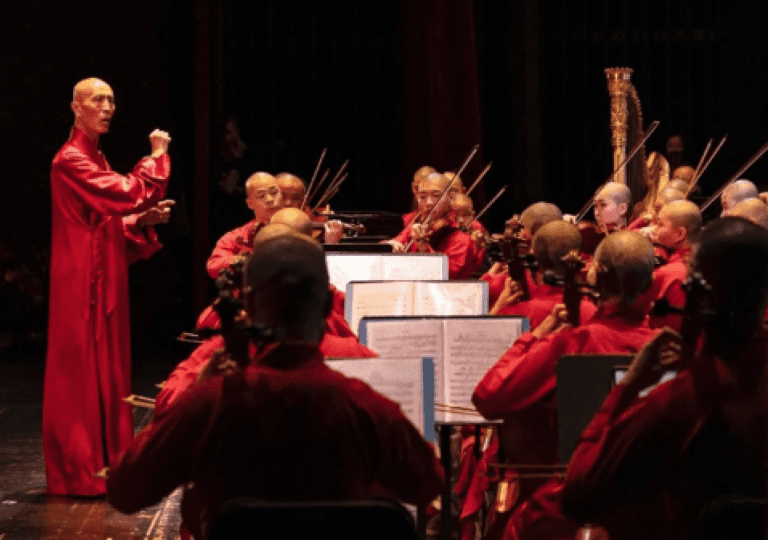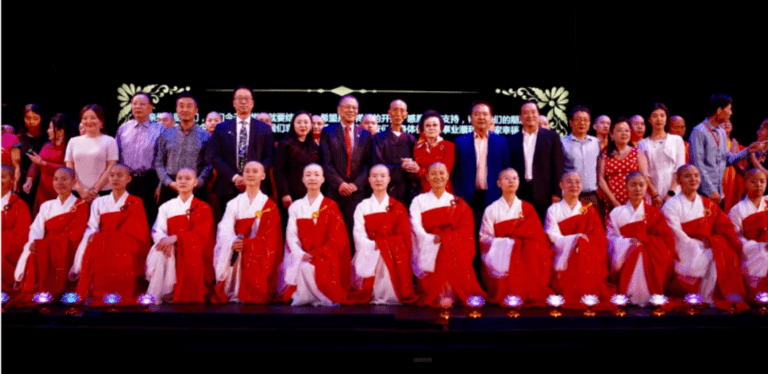Chan Master Shi Wule

Born in 1948 in Jincheng, Shanxi Province, his father was a general in the Red Army of the Fourth Front who traveled on the Long March. 1961, he met his fundamental master in Wuhan, who taught him to meditate on “service to the people”.
From then on, he practiced with his guru for decades, and gradually found the key to happiness and success in the meditation of “serving the people”. 1975, he graduated from the Wuhan Conservatory of Music, majoring in violin, and from 1975 to 1989, he followed his guru’s arrangement of working as a teacher, joining politics, doing business, and attending schools all over the world.
The meditation of “serving the people” opened the door to harvest for every step of his life. 1989, his father passed away, and he followed his master to Aba, Sichuan Province, where he shaved his head and received the Tibetan Vajra precepts.
1996, his mother passed away and he became a monk. 1997, he took up residence at Taiping Monastery in Hong’an, a place where the center of economic construction was the center of the world.
At that time, the wave of economic construction was sweeping through every corner of China. He put forward the idea of cultivation of “Holy Virtue and Truthfulness, becoming a Buddha through Virtue”, proposed the establishment of culture, and began to explore and practice the three Chan cultures of “Chan Music, Chan Tea, and Chan Forest”.
In 2003, he was invited by the county government of Hong’an County to come to Tiantai Mountain in Hong’an, and in 2004, he began to restore and rebuild Tiantai Temple, which has a history of 1,400 years, to establish the temple by true cultivation and evidence, to establish the temple by culture, and to continue the practice of “Sacred Virtue, True Ru, Become a Buddha by Virtue”.
The temple was founded on the basis of true practice and evidence and culture; it continues the practice of “Sacred Virtue, Becoming Buddha by Virtue”, and creates the Tiantai Three Chan Culture of “Chan Music, Chan Tea, and Chan Grove”. With the strength and ability of the Chan master, can go everyone thinks the simple way, and fame and fortune, but he seeks suffering, resolutely resigned from a variety of social positions (for the development of the Tiantai Temple, only to retain the county Buddhist Association, the post), do not go down to the mountains to meet, do not take the initiative to make friends with the rich and powerful, adhere to the mountains, adhere to the disciples, adhere to promote Chan, adhere to the Chan and the current social dance of the difficult road. 2006, the establishment of Wuchang In 2006, he established the Art Class of Wuchang Buddhist Academy.



In 2007, the Chan master, then vice president of the Association of Chinese Buddhist monk Jinghui personally for the completion of the hall statue of the opening of the abbot ascension celebration of the law, and personally passed the ancestral clothes, dust whisk, the law scroll, publicly recognized him as a closed door disciple and the law of the verse said: “high standard purpose of the head of the ten thousand peaks, a faction of the wind and turbid flow of the different. Recognize the stringless qin outside the meaning of the vast sea of people to ride the boat of mercy”. In the same year, was brought by the government of Singapore rich businessmen, and refused the other side for him to build fame program, because this program changes the nature of the practice.
In 2008, established an art troupe.
In 2009, at the International Medicine Master Dharma Conference held at Fujian Puzao Chan Temple, the centenarian monk, international Buddhist leader, and the only living closed disciple of Grandmaster Hongyi at that time, Lord Guangxuan, publicly bestowed upon him the five treasures of Dharma Crown, Ruyi, Dust Whisk, Dragon Scepter, and Tin Scepter in order to show his seal of approval, and bestowed upon the name of the Art Troupe, Guangxuan, and designed the logo of the Troupe, and instructed him to carry on the legacy of Grandmaster Hongyi, to bring music to the world, to make it the most important music in China.
In 2013, he overcame many obstacles and resigned from the position of abbot of Tiantai Monastery and all social positions, and set up the “Tiantai Monastery Permanent Resident Plenary Assembly” as the highest authority, handing over all the power to the monastic community, and was only responsible for practicing and preaching the Dharma without any administrative power, so as to return to the great idea of the Buddha’s equality of all living beings and to pass on the Six Harmonies Veneration. In this way, he returned to the Buddha’s great idea of the equality of all beings and passed on the Six Harmonies. In the same year, he handed over his cell phone to his disciples to assist him in taking care of it, and took the lead in strictly holding the cell phone precepts, and all external contacts were made through the public cell phone in the hands of his disciples; in addition, his personal accounts and red envelopes, which had been implemented a long time ago, were jointly managed by his attendants (more than two people); and he placed everything under the supervision and management of the Sangha. 2014, he set up Tiantai Monastery’s Buddhist Music Institute. 2015, he set up the all-monastic “Jinghui Symphony Orchestra”, ‘Dawn Chorus’, and ‘Xianggen Dance Troupe’, and embarked on a global tour.In 2019, in response to the national initiative
In 2019, in response to the national initiative of “One Belt, One Road”, to promote traditional Chinese culture overseas, and to realize the pursuit of “practicing and serving the country”, he came to Madagascar, an island country in Africa, to build the Xizu Temple in his old age, with a large number of young monks voluntarily following him. 2023, in February.
In February 2023, he led a group to Mauritius to perform Chan music, which was a great success; from June to July of the same year, he led a group to tour the United States, which was widely praised and greatly promoted the national prestige; on October 27 of the same year, the opening ceremony of Xizu Temple was held and the abbot was promoted to abbot, who was honored with the title of abbot. 2024, he will continue to lead the Chan Orchestra to deepen the practice of Chan meditation, in order to actively prepare for the performance in the headquarters of the United Nations Educational, Scientific and Cultural Organization (UNESCO) in the second half of the year and the tour in Europe, so as to promote the Chinese traditional culture and serve the world peace.
In 2024, he will continue to lead the Chan Orchestra to deepen his meditation practice and actively prepare for the performance at the UNESCO Headquarters and the European tour in the second half of the year, in order to promote Chinese traditional culture and serve world peace. …… Life goes on and on. To dedicate one’s body and mind to the Dust Temple is to repay the Buddha’s kindness. The monks are practicing the Dharma. May you drink the milk of the Dharma to your heart’s content.



